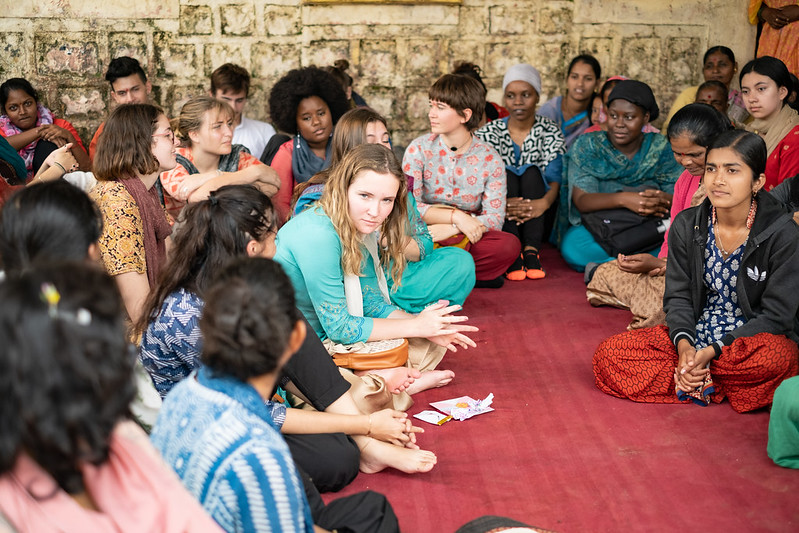One of the
most rewarding aspects of traveling is the opportunity to immerse yourself in
different cultures. A powerful way to connect with locals and gain a deeper
understanding of a place is by learning the local language. In this post, we'll
explore the benefits of learning a new language while traveling and provide
practical tips to help you get started on your linguistic journey.
1.
Connect on a Deeper Level
Language is
the key to unlocking a culture's heart and soul. When you speak the local
language, you can engage in meaningful conversations with locals, share
stories, and gain insights into their way of life. This connection goes beyond
the surface and allows you to form genuine bonds.
2.
Enhance Your Travel Experience
Learning
the local language opens doors to unique experiences that may not be accessible
to non-speakers. You can confidently navigate local markets, decipher street
signs, and explore hidden gems that aren't in tourist guidebooks. It also helps
you avoid common tourist traps.
3. Show
Respect and Appreciation
When you
make an effort to learn the local language, you demonstrate respect for the
culture and people you encounter during your travels. Locals often appreciate
your attempts to communicate in their language, even if you make mistakes. It's
a sign of cultural humility and curiosity.
4. Boost
Your Confidence
Mastering
even a few basic phrases in the local language can significantly boost your
confidence while traveling. You'll feel more self-reliant and less reliant on
others for translation or assistance.
5.
Overcome Language Barriers
Language
barriers can be frustrating, but learning the local language helps you overcome
them. You'll be better equipped to ask for directions, order meals, and handle
unexpected situations with ease.
6.
Immerse Yourself in Authentic Experiences
Speaking
the local language allows you to immerse yourself in authentic cultural
experiences. Whether it's attending local events, participating in workshops,
or simply conversing with locals in their own tongue, you'll gain a richer
understanding of the culture.
7.
Expand Your Mind
Learning a
new language is a mental workout that can enhance your cognitive abilities. It
sharpens your problem-solving skills, memory, and multitasking capabilities.
Plus, it exposes you to new ways of thinking and expressing ideas.
8. Gain
a New Perspective
Languages
often reflect a culture's values, history, and worldview. Learning the local
language can provide you with a fresh perspective on the world and broaden your
horizons.
9. Break
Down Stereotypes
By learning
the local language, you can break down stereotypes and misconceptions about a
culture. You'll see people as individuals with diverse experiences and
perspectives rather than as stereotypes or caricatures.
10.
Enjoy the Journey
Learning a
language is a journey in itself, filled with challenges, victories, and moments
of growth. Embrace the process and enjoy the satisfaction of making progress,
even if you're not fluent.
Tips for
Learning the Local Language:
- Start with the Basics: Begin with essential phrases
like greetings, numbers, and common expressions. This foundation
will help you in everyday interactions.
- Take Language Classes: Consider enrolling in language
classes at a local school or community center. Language apps and
online courses are also excellent resources.
- Practice Daily: Dedicate time each day to
practice speaking, listening, and reading in the local language. Consistency
is key to improvement.
- Use Language Apps: There are numerous
language-learning apps like Duolingo, Babbel, and Rosetta Stone that make
learning convenient and fun.
- Engage with Locals: Don't be afraid to strike up
conversations with locals. They are often eager to help you learn and will
appreciate your efforts.
- Watch Local TV and Films: Immersing yourself in local
media is an enjoyable way to improve your language skills and familiarize
yourself with accents and colloquialisms.
- Keep a Journal: Document your
language-learning journey in a journal. Write about your experiences,
challenges, and successes in the local language.
- Be Patient and Persistent: Language learning can be
challenging, but don't get discouraged by mistakes. Embrace them as
opportunities to learn and grow.
- Immerse Yourself: If possible, spend time in
regions where the local language is spoken as the primary language. Total
immersion can accelerate your learning.
- Celebrate Milestones: Celebrate your
language-learning milestones, whether it's holding your first conversation
or mastering a challenging aspect of grammar.
Learning
the local language while traveling is a transformative and rewarding endeavor.
It enriches your travel experiences, fosters cultural understanding, and opens
doors to deeper connections with people from all walks of life. So, embark on
your linguistic journey with enthusiasm and curiosity, and let the language of
a place become your passport to its culture and soul.


Enviar um comentário